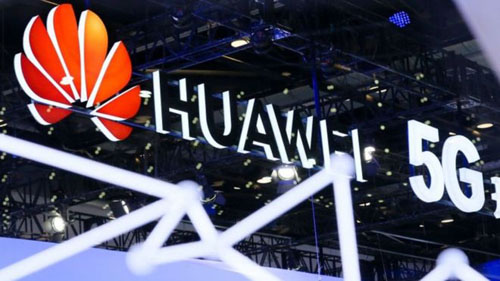FPI / May 26, 2020
Commentary by Lee Cohen
In a welcome shift of policy that affects the “Special Relationship” between the U.S. and its greatest ally, the UK, Britain announced over the weekend that “Boris Johnson has instructed officials to draw up plans that would see China’s involvement in the UK’s infrastructure scaled down to zero by 2023.”
This news has particular significance for China telecoms giant Huawei which has a significant stake in the buildout of the UK’s 5G network.

Implementing the UK’s critical information infrastructure with Huawei’s equipment exposes not only UK, but shared U.S. intelligence, to the threat of espionage by the authoritarian Chinese Communist Party, whose leader Xi Jinping has actually stated “high-end technology is the weapon of a modern country.”
British Prime Minister Boris Johnson, formerly a supporter of Huawei’s involvement due to favorable pricing and budgetary concerns, has directed officials to form a plan to eject the company, which UK parliamentarians have warned is “high risk” and bad for Britain’s national security.
This bodes well, both for Britain domestically, and for its trade relationship with the U.S, at the critical time that a free trade agreement is being negotiated between the two nations.
Geostrategy-Direct.com reported in July 2019, citing a study by cybersecurity research firm Finite State, that Huawei was installing in a large percentage of its products at least one backdoor access point that will enable Chinese intelligence to conduct cyber operations.
Related: Study discovers back doors in 55 percent of 5G-dominant Huawei’s hardware, July 9, 2019
The coronavirus has been a watershed moment for nations, including the U.S. and Britain, to re-assess China relations, and may be one silver lining of the devastation caused by the pandemic.
On Saturday, the U.S. Commerce Department took steps to add 33 China entities to a trade blacklist to restrict access to U.S. technology and other items. It argued that some of these entities have exposure to the Chinese military, while others were human rights violators
Indeed, a chorus of protest has erupted on both sides of the Atlantic raising alarm over Huawei deployment in the UK. Fortunately, these efforts have not fallen on deaf ears.
U.S. President Donald Trump has long been critical of UK plans for Huawei’s involvement in the UK’s infrastructure, but Covid-19 appears to have elevated the level of anxiety considerably. In order to convey the gravity of its concerns, the Trump administration actually suggested restricting UK access to the Five Eyes Security Network with other partners, Canada, Australia, and New Zealand.
Further concern prompted Sen. Tom Cotton, Arkansas Republican, to author an amendment to the 2021 Defense Authorization bill to block deployment of 48 F-35 fighter jets to the UK, indicating “While the United States will do all we can to maintain and strengthen the special relationship, protecting U.S. airmen and our national security assets must come first.”
Indeed, anxiety flows over into trade discussions where some members of Congress have threatened to exert influence to make the long-anticipated U.S.-UK trade deal conditional on Britain rejecting Huawei.
So too, many British parliamentarians have expressed vociferous concerns that appear to have influenced the change of policy with respect to China. For instance, Tom Tugendhat, Chairman of the House of Commons Foreign Affairs Committee, urged: “This is serious. We need to rethink the Huawei decision. It is not about 5G, it’s about strategic partnership with countries that have not shown themselves to be allies.” In a Tweet over the weekend, Tugendhat wrote in response to the UK government’s new Huawei posture: “I’ve been asking for this for 3 years. The U.S. sanctions make it even more necessary. We need to rethink our dependence on countries that don’t share our values and seek to undermine our interests.”
Back in March, 38 MPs in Johnson’s Conservative party rebelled against the government to try to force its hand to release a plan to eject Huawei by 2022. While that particular effort failed, now that goal appears to be back in sight.
Britain has achieved Brexit, though pernicious details still persist such as negotiating a final divorce deal (currently in stalemate) with the EU. Britain’s greatest allies are those — hardly China or the EU — like the U.S. who realize the weight and value of not only the trade and defense relationships, but of the values and trust that bind our alliance.
It is clear that Huawei has ramifications for the Trans-Atlantic relationship and beyond. Like the U.S., the UK is re-thinking its relationship with China. In an ideal world, we could all have an open and fair relationship with the Chinese.
Sadly, with the great progress ushered in by the digital world comes the reality of exposure to national security and economic compromises.
But the coronavirus must serve as a wake-up call for traditional allies to recognize that notwithstanding the temptations of “going global,” our friends are our friends for a reason.
Moreover, the whole world must recognize the hazards of a Chinese government that former Downing Street Chief of Staff Nick Timothy called “a menace, manipulating international institutions, setting debt traps to bring countries under its control, abusing the international trading system, engaging in industrial espionage and using telecommunications technology to embed itself in societies, economies and security systems.”
Lee Cohen, a writer, commentator and research fellow of the Danube Institute, was adviser on U.S.-UK policy to the House of Representatives Foreign Affairs Committee.
FPI, Free Press International
